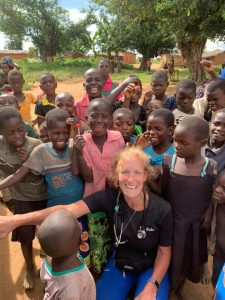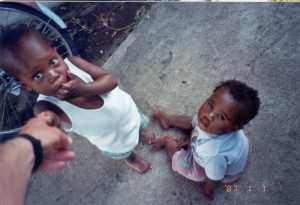Peace Through Health: Keeping my dream for Malawi alive
By Chimwemwe Kumwenda
The English novelist Graham Greene once said, “There is always one moment in childhood when the door opens and lets the future in”.

As a young girl, I remember walking past a group of black and white men wearing similar shirts and working together to build a brick wall fence around Mwami Mission Hospital. The hospital, located 30km from Chipata in the Eastern Province of Zambia, served the small community I grew up in. I was curious and asked my dad about the men. He told me they were volunteers and had come to help at the hospital. I thought that was very kind of them and wished I could also do some volunteer work someday. All I knew was that volunteers helped make their community better, just like the men I saw building the wall. That moment, the door opened, and the future was let in.
Today, I am privileged to volunteer with the Rogue Humanitarians and at Dzaleka Refugee camp in Dowa, Malawi. This experience has been fulfilling and enriching. It has opened the door for a Rotary Peace Fellowship at Duke-UNC Rotary Peace Center and the University of North Carolina at Chapel Hill as a graduate student in Public Health.
Worry and uncertainty during the Coronavirus pandemic
Due to the Covid-19 pandemic, I had to abruptly return home to Malawi from the United States to be with my husband and children. It was a difficult time for me and other Peace Fellows as we had to make significant changes to our plans, both academic and personal. Before the pandemic, I had been offered a 3-month internship at the World Health Organization (WHO) in Mauritius, and I was scheduled to travel in the next three months. I was excited about the offer and was confident that my experience at WHO, combined with the knowledge and skills I am gaining as a Peace Fellow would significantly advance my work in Malawi upon completion of the fellowship. Now that travel had been suspended and I could not do the internship remotely, I had to make new plans and the next best thing was to travel back home to be with my family.
While waiting to board my connecting flight at Raleigh-Durham International Airport, the unusual quietness at the deserted airport gave me pause to deeply think. I reflected on the knowledge and skill I was taking home after only seven months as a Peace Fellow and contemplated on what was going to happen next. With the ongoing pandemic, I was worried that I would not be able to return to the US to complete my studies. With that looming possibility, I started to think about how to make my premature return home beneficial to the people I had left in Malawi. I reflected on my dream and the reason I had applied for the Rotary Fellowship. I wanted to attain knowledge and skill to ably influence policymakers and leaders to develop programs that promote good health and reduce the existing health disparities in Malawi and globally.
Building Resilience and seeing light at the end of the tunnel
With the pandemic worsening, the worry and uncertainty grew. I thought my dream for Malawi was dying until recently when the roadmap for my studies became clearer. Despite the current challenge, Duke-UNC Rotary Peace Center has greatly supported us to be resilient and continued to make the program successful. We will be able to continue with the fellowship online during the fall semester and return to the US in January for in person classes. Another exciting thing that will keep my dream alive is the internship that I was offered in May by Rotary District 5110.
My road to a Summer Internship with Rotary District 5110
I started volunteering at Dzaleka Refugee Camp’s clinic as a medical doctor three years ago and during that time, I had started applying for the Rotary Peace Fellowship. One day, Pax Matipwiri, a Rotary Global Grants Scholar, and Chuck Root, the current Peace Fellow Chair, former Foundation chair and Governor for my sponsor district 5110, introduced me to Dr Lucinda Kolo, founder and CEO of Rogue Humanitarians from Oregon, U.S. She had a passion for providing free medical care to the less privileged. She planned to visit Malawi and conduct some outreach clinics in hard-to-reach, medically under-served villages around Lilongwe, the capital city.

Last year, Chuck started working on helping the Rogue Humanitarian’s work in Malawi to be more sustainable. District 5110 consists of 68 clubs in Central and Southern Oregon, and part of Northern California and they were planning to apply for a Rotary Global Grant. The Global Grant supports large international activities with sustainable outcomes in Rotary’s six areas of focus. One area of focus is fighting disease by educating and equipping communities to stop the spread of life-threatening diseases. In this case, if approved, the grant for Malawi would help train village volunteers and health workers in critical areas. This was very exciting as it would be a great opportunity to help Malawians that lacked access to quality healthcare services. I was offered an opportunity to be part of this great initiative as an internship and this has revived my dream for Malawi.
An opportunity to build positive peace through health

Malawi is often described as one of the poorest countries with a low ranking on health system among countries not affected by civil wars. The day I started working with District 5110, I saw a huge opportunity to build positive peace through sustainable health promoting initiatives. Positive peace is defined as the attitudes, institutions, and structures that create and sustain peaceful societies. According to Phil Vernon, former Director of Programs at International Alert, a healthy person has more options. They can attend school, earn and save more, and have better control of their life. They are more likely to be in a position to stand up for peace and against violence and war.
For this project, the question we are trying to answer is: “How do we efficiently extend the Rogue Humanitarian’s work to benefit more rural Malawians and continue to impact generations to come?” Firstly, we conducted a community needs assessment to understand the needs of the villagers and the health centers that serve them. We have heard the community’s thoughts and ideas from leaders and stakeholders at almost all levels of the country’s health system. Some of the areas for action identified include lack of human and material resources, malaria, lack of judicious use of antibiotics (which has increased the risk of emerging infections and resistant pathogens), and premature births. While these may be complex problems that cannot be easily resolved, we believe education has an enormous potential to have a positive impact on health and sustainability. With education, the focus is on improvement of health and better delivery of healthcare rather than late intervention in disease. With the right training, village volunteers and health workers can then utilize the available community assets to address most of these problems. This will ultimately promote an optimal environment for the villagers’ human potential to flourish- positive peace.

The need to unite to create lasting change and positive peace for Malawi
In one of Chuck’s emails, I saw this beautiful quote which is the Rotary Foundation vision statement: “Together, we see a world where people unite and take action to create lasting change – across the globe, in our communities and in ourselves”.
My experience interning with District 5110 has helped me realize the numerous networking efforts within Rotary International to promote health and prevent disease. One such effort is the elimination of malaria by a volunteer organization called Rotarians Against Malaria (RAM)-Global Rotary Action Group, which I have recently joined. As we apply for the grant, we are collaborating with the private sector and the government of Malawi to develop sustainable health solutions. However, the government or international organizations’ efforts alone are not enough. I believe that through our collective efforts, we can efficiently promote health and reduce the existing inequalities.

We all have the ability to achieve this either at an individual, community, or societal level. As health practitioners for example, we can mobilize our skills and move a few extra miles by either treating illnesses early or helping to train other health workers. Those lacking the medical skills but with the financial capabilities can, with as little as $10, fuel a vehicle and enable the movement of 5 -10 health workers over a distance of 62 miles. Others have good advocacy skills while others can provide the required emotional support. We all have the potential to promote peace and create a sustainable world that is beneficial for everyone. The pressing question then remains: ‘What can you and I do today to create a healthy and peaceful society?’